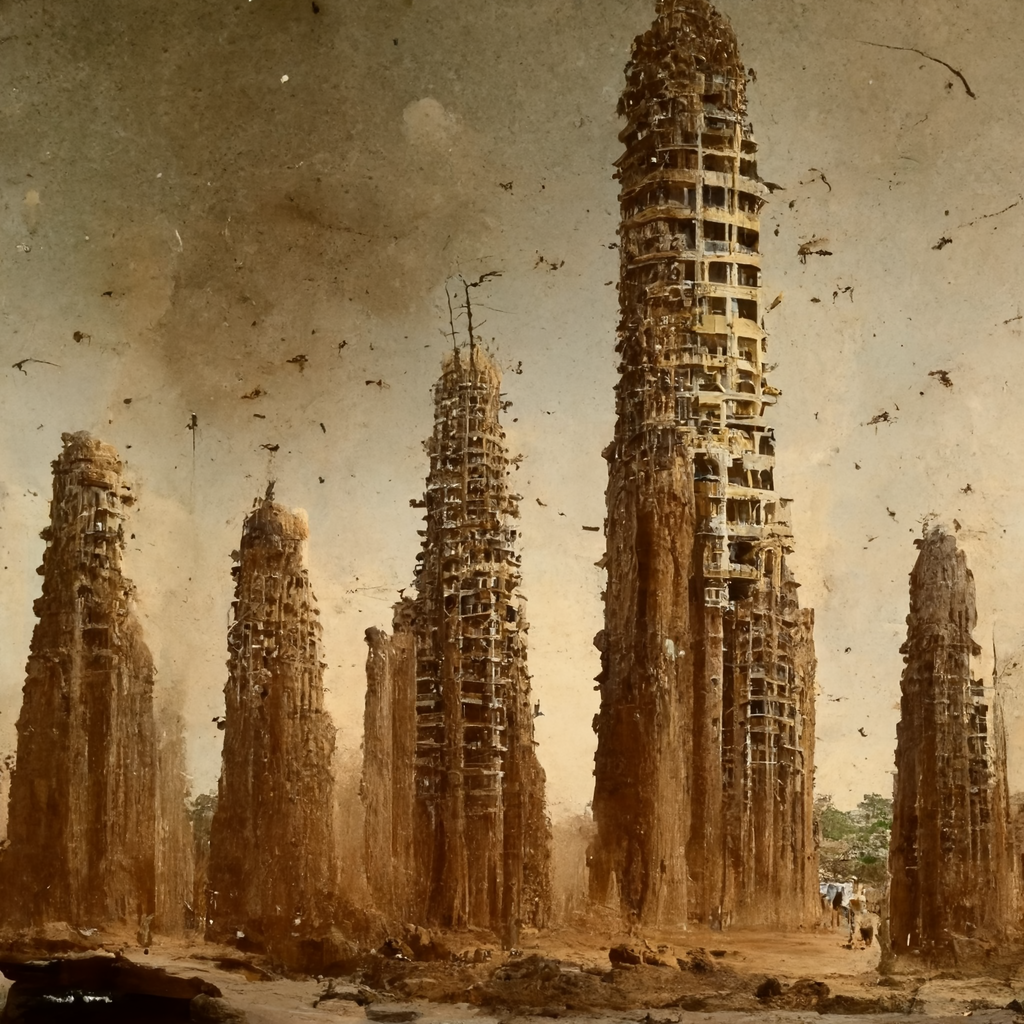METROPOLITAN NIGHTMARE
By:
December 22, 2022
A series dedicated to poems, published c. 1900–1935, the Radium Age sf-adjacent themes of which include: dystopia and utopia, far-out mathematics and the fourth dimension, Afro-futurism, catastrophe, future war, new technologies, scientific breakthrough, dehumanization, cosmic awe, disenchantment and unseen forces, unknowable aliens and singularity. Research and selection by Joshua Glenn; thematic index here.

It rained a lot that spring. You woke in the
morning
And saw the sky still clouded, the streets
still wet,
But nobody noticed so much, except the
taxis
And the people who parade. You don’t, in a
city.
The parks got very green. All the trees were
green
Far into July and August, heavy with leaf,
Heavy with leaf and the long roots boring
and spreading,
But nobody noticed that but the city
gardeners
And they don’t talk.
Oh, on Sundays, perhaps you’d notice:
Walking through certain blocks, by the
shut, proud houses
With the windows boarded, the people
gone away,
You’d suddenly see the queerest small
shoots of green
Poking through cracks and crevices in the
stone
And a bird-sown flower, red on a balcony,
But then you made jokes about grass
growing in the streets
And gags and a musical show called “Hot
and Wet.”
It made a good box for the papers. When
the flamingo
Flew into a meeting of the Board of
Estimate,
The new mayor acted at once and called
the photographers.
When the first green creeper crawled upon
Brooklyn Bridge,
They thought it was ornamental. They let it
stay.
That was the year the termites came to
New York
And they don’t do well in cold climates —
but listen, Joe,
They’re only ants, and ants are nothing but
insects.
It was funny and yet rather wistful, in a way
(As Heywood Broun pointed out in the
World-Telegram)
To think of them looking for wood in a steel
city.
It made you feel about life. It was too
divine.
There were funny pictures by all the smart,
funny artists
And Macy’s ran a terribly clever ad:
“The Widow’s Termite” or something.
There was no
Disturbance. Even the Communists didn’t
protest
And say they were Morgan hirelings. It was
too hot,
Too hot to protest, too hot to get excited,
An even African heat, lush, fertile and
steamy,
That soaked into bone and mind and never
once broke.
The warm rain fell in fierce showers and
ceased and fell.
Pretty soon you got used to its always
being that way.
You got used to the changed rhythm, the
altered beat,
To people walking slower, to the whole
bright
Fierce pulse of the city slowing, to men in
shorts,
To the new sun-helmets from Best’s and
the cop’s white uniforms,
And the long noon-rest in the offices,
everywhere.
It wasn’t a plan or anything. It just
happened.
The fingers tapped slower, the office-boys
Dozed on their benches, the bookkeeper
yawned at his desk.
The A.T.&T. was the first to change the
shifts
And establish an official siesta-room;
But they were always efficient. Mostly it just
Happened like sleep itself, like a tropic
sleep,
Till even the Thirties were deserted at noon
Except for a few tourists and one damp
cop.
They ran boats to see the big lilies on the
North River
But it was only the tourists who really
noticed
The flocks of rose-and-green parrots and
parakeets
Nesting in the stone crannies of the
Cathedral.
The rest of us had forgotten when they first
came.
There wasn’t any real change, it was just a
heat spell,
A rain spell, a funny summer, a
weather-man’s joke,
In spite of the geraniums three feet high
In the tin-can gardens of Hester and
Desbrosses.
New York was New York. It couldn’t turn
inside out.
When they got the news from Woods Hole
about the Gulf Stream,
The Times ran an adequate story.
But nobody reads those stories but
science-cranks.
Until, one day, a somnolent city-editor
Gave a new cub the termite yarn to break
his teeth on.
The cub was just down from Vermont, so
he took his time.
He was serious about it. He went around.
He read all about termites in the Public
Library
And it made him sore when they fired him.
So, one evening,
Talking with an old watchman, beside the
first
Raw girders of the new Planetopolis
Building
(Ten thousand brine-cooled offices, each
with shower)
He saw a dark line creeping across the
rubble
And turned a flashlight on it.
“Say, buddy,” he said,
“You’d better look out for those ants. They
eat wood, you know,
They’ll have your shack down in no time.”
The watchman spat.
“Oh, they’ve quit eating wood,” he said, in a
casual voice,
“I thought everybody knew that.”
—and, reaching down,
He pried from the insect jaws the bright
crumb of steel.
— Stephen Vincent Benét’s poem “Metropolitan Nightmare” (1 July 1933 The New Yorker). Its first publication date has also been given as 1927. Note that Benét’s 1937 story “The Place of the Gods” (vt, “By the Waters of Babylon”) is a proto-Kamandi Ruined Earth story about a tribal adolescent boy who explores the ruins of a vast destroyed city he calls “newyork” (ie New York).
RADIUM AGE PROTO-SF POETRY: Stephen Spender’s THE PYLONS | George Sterling’s THE TESTIMONY OF THE SUNS | Archibald MacLeish’s EINSTEIN | Thomas Thornely’s THE ATOM | C.S. Lewis’s DYMER | Stephen Vincent Benét’s METROPOLITAN NIGHTMARE | Robert Frost’s FIRE AND ICE | Aldous Huxley’s FIFTH PHILOSOPHER’S SONG | Sara Teasdale’s “THERE WILL COME SOFT RAINS” | Edith Södergran’s ON FOOT I HAD TO… | Robert Graves’s WELSH INCIDENT | Nancy Cunard’s ZEPPELINS | D.H. Lawrence’s WELLSIAN FUTURES | & many more.
